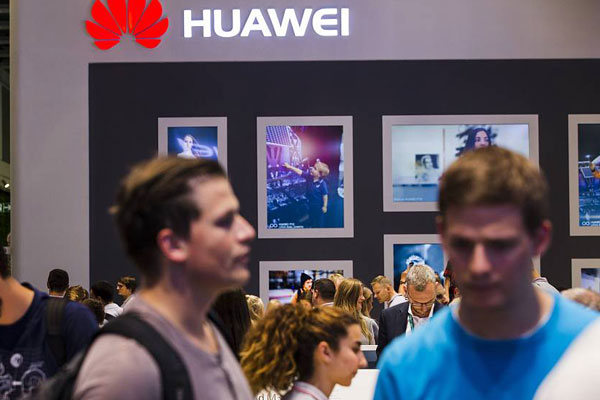Media Report

- CNN reports, "The United Kingdom could undermine an American-led campaign to keep Chinese tech company Huawei out of super-fast 5G mobile networks around the world. The National Cyber Security Centre, part of the UK intelligence service, has concluded that there are ways to limit the risks of using Huawei to build next-generation wireless networks, according to a report by the Financial Times. Huawei, the world's biggest maker of telecommunications equipment, has been on the defensive in recent months as the US government has pushed for the company's technology to be banned, alleging that it could be used by China for spying. Australia and New Zealand have already blocked mobile carriers from using Huawei for 5G networks, and other governments, including the United Kingdom, are reviewing the situation."
- The New York Times reports, "Businesses and government agencies in the United States have been targeted in aggressive attacks by Iranian and Chinese hackers who security experts believe have been energized by President Trump's withdrawal from the Iran nuclear deal last year and his trade conflicts with China. Recent Iranian attacks on American banks, businesses and government agencies have been more extensive than previously reported. Dozens of corporations and multiple United States agencies have been hit, according to seven people briefed on the episodes who were not authorized to discuss them publicly. The attacks, attributed to Iran by analysts at the National Security Agency and the private security firm FireEye, prompted an emergency order by the Department of Homeland Security during the government shutdown last month."
- Bloomberg reports, "China's space ambitions are shifting into a higher orbit. Following its successful and world-beating trip to the far side of the moon, China is preparing to build a solar power station in space, as the world's No. 2 economy strives to burnish its superpower credentials. With an $8 billion annual budget for its space program, second only to the U.S., China is seeking to compete with its rival for economic, military and technological dominance. Scientists have already started construction of an experimental base in the western Chinese city Chongqing. Initially, they plan to develop a smaller power station in the stratosphere between 2021 and 2025, a 1 megawatt-level solar facility in space by 2030, and eventually larger generators, according to the state-backed Science and Technology Daily."
Calendar
- 2019-02-17 China's new trade offer is better than a tariff war
- 2019-02-15 China and US will continue high-stakes trade talks in Washington next week
- 2019-02-14 Top U.S. trade envoys to meet China's Xi, no decision on deadline extension
- 2019-02-13 Administration Readies Order to Keep China Out of Wireless Networks
- 2019-02-12 China, U.S. Seek to Narrow Gap on Trade for Trump, Xi to Close at a Summit
- 2019-02-11 Trump officials considering Mar-a-Lago for next meeting with China's Xi: report
- 2019-02-10 White House discussing possible trade summit with China at Mar-a-Lago: report
- 2019-02-01 Trump plans to meet Chinese leader Xi Jinping to resolve trade dispute
- 2019-01-31 Trump Says No Final China Trade Deal Until He Meets With Xi
- 2019-01-30 Critical China trade talks open amid tough U.S. action against Huawei
News
- CNN UK spies think they can handle Huawei in 5G networks. The US doesn't agree
- The New York Times Chinese and Iranian Hackers Renew Their Attacks on U.S. Companies
- Bloomberg China Wants to Build the First Power Station in Space
- The Wall Street Journal China's Property Market, Once a Lifeline, Now Carries Economic Risks
- The Washington Post China seizes $1.5 billion in online lending crackdown
- The National Interest The Little-Known Security Gaps In China's Belt and Road Initiative
- The Washington Post World stocks mostly rise ahead of more China-US trade talks
- CNN Carmakers brace for a terrible year as China's slowdown deepens
- The Washington Post For sake of pupils' pupils, China to ban homework on apps
- Reuters China unveils plans to develop Greater Bay Area
- The Washington Post China's leaders want more babies, but local officials resist
- Reuters Chinese traders cut Australian coal imports over customs delays: sources
- The New York Times 'Show Me That My Father Is Alive.' China Faces Torrent of Online Pleas.
- Reuters Exclusive: China ride-hailing giant Didi plans Chile, Peru launches to take on Uber
- Bloomberg Pig Disease Found in Dumplings Triggers Slump in Chinese Food Maker
Commentary
- CNBC It's looking like a US-China trade deal is near — and Beijing will get everything it wanted
- TIME Russia and China Are Driving a Wedge Between Estranged U.S. and Europe
- Forbes Dear China, Get Ready For 25% Tariffs
- Bloomberg China Can't Prettify Cosmetics Profits Forever
- Financial Times Fears of party influence on Chinese groups are overblown
- Forbes China's Top Problem Isn't The Trade War
- The National Interest The Type 81: Meet China's Very Own AK-47 Rifle
- Financial Times Kashmir attack revives India-China tensions
